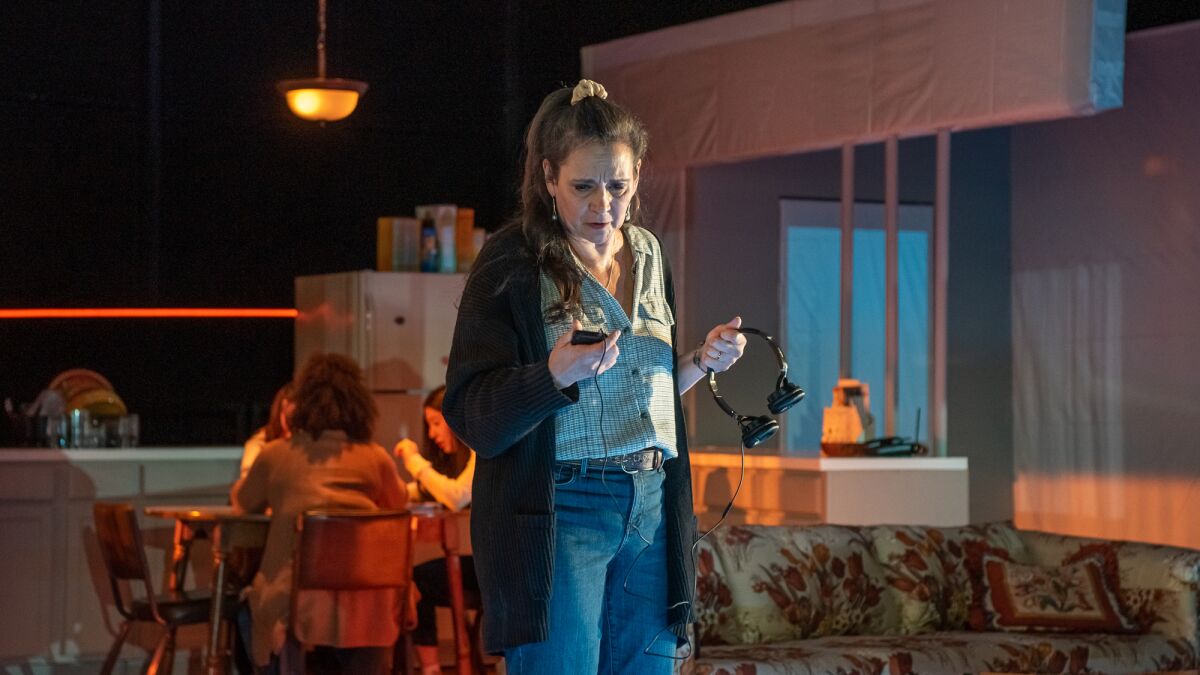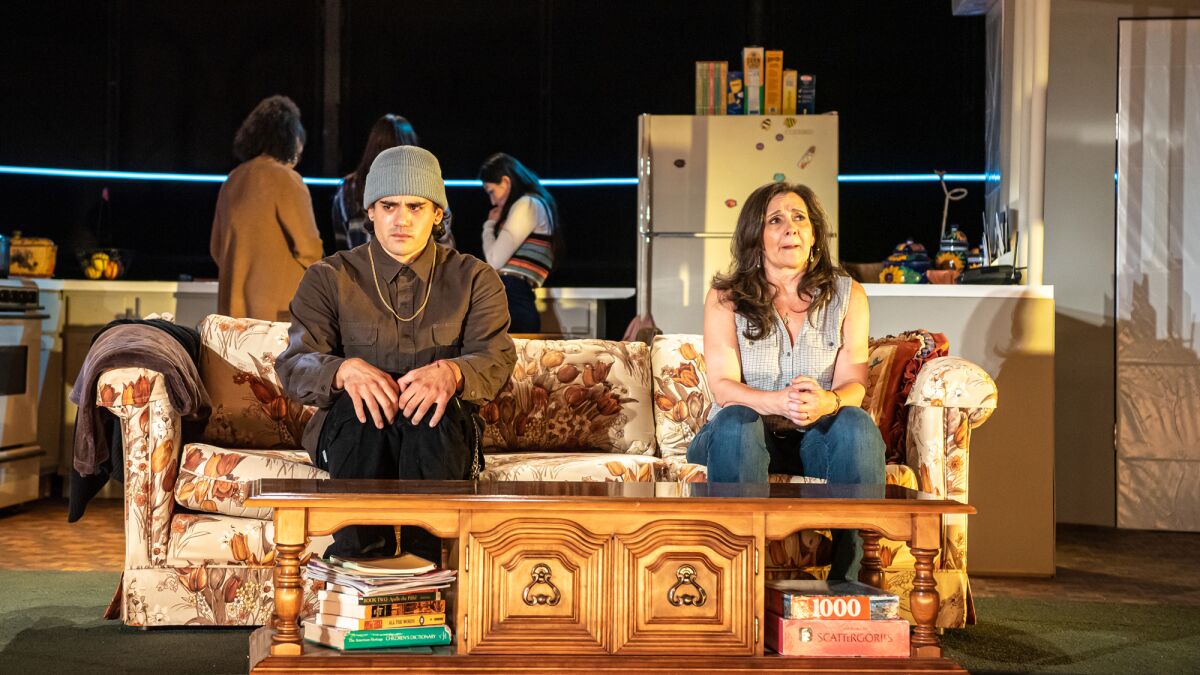Joy, grief and the complexities of motherhood are the heart of new play ‘Scene With Cranes’
The resounding din of cries fills REDCAT, bouncing off the walls in an eerie harmony. Lourdes (Marissa Chibás) steps inside her home where her daughter, Yolie (Hannah Trujillo), and her best friends, Letty (Angela Rosado) and Ruby (Stacia Marcum), grieve the death of Nico (Isaias Alexander Miranda), Lourdes’ son. Lourdes is quiet.
The beginning of Octavio Solis’ new play, “Scene With Cranes,” allows an intense sense of pain to surface. The world-premiere play, which kicked off the 20th-anniversary season of CalArts Center for New Performance earlier this fall, provides the Latino matriarch a stage to display the complexities and brutal truths of what it means to be a mother, showing the power a mother has — and must withhold — to keep the family unit together. The theme of motherhood is embedded in the DNA of Solis’ play, but it was also prevalent in the process of bringing the story to life.
Halfway through workshopping “Scene With Cranes” in 2019, Chibás’ son got very ill and was hospitalized. She had to take time away from the two-week workshop to be with him, returning on the last day.
“He’s doing well now, but I had this moment of like, ‘Wow, that was really close to home,’” Chibás says. The fear and grief hovered over her while she was working on the play, embodying a character who was doing the same. “It was tremendously challenging, and actually, there was a part of me that was like, ‘I don’t want to come back to that,’” she adds. “It’s really the worst nightmare for a parent.”

Marissa Chibás rehearses on the set of “Scene With Cranes.”
(Gema Galiana)
Chibás explains that her character goes through all seven stages of grief and “it’s very clear which section is anger,” she chuckles.
“The great thing that Octavio [Solis] does is he takes us somewhere through the grief, and that there is something on the other side of that grief,” she says.
The idea for “Scene With Cranes” came to Solis while he was listening to Jean Sibelius’ work of the same name and watching the local news. On the screen, he saw a parent in disbelief, surrounded by yellow tape and a police car’s red and blue flashing lights, as she tried to speak through the grief of what seemed to be a family member’s death.
“I just saw that person trying to articulate how she was feeling, grief written all over her face,” Solis says. “She was weeping while I was hearing this music.” In that moment, he saw how a story of grappling with grief and healing could translate into a potent work onstage. . He proposed the project to CalArts Center for New Performance artistic director Travis Preston and Chibás, who is also the director of Duende CalArts, an initiative of the institution dedicated to producing Latino work. However, he didn’t have a script. Instead, he provided a 12-page poem that was like “a series of Polaroids” of what he envisioned for the story.
“We felt that it [‘Scene With Cranes’] was important because the work has a great deal of relationship to healing,” Preston says. “And healing is an important consideration at this moment.”
The development of the play was paused by the pandemic, but the grief stemming from COVID-19 brought a new weight and importance to the production as they ramped it back up for a second workshop in October 2021. Solis explains that working on “Scene With Cranes” helped him ease back into theater, immersing himself into the world through the play’s two months of rehearsals. The time allowed everyone to “deepen our work,” he says, and bring to life the Latino voices that shape the story. The project also was powered by a majority Latino team.
“We need our stories out there,” Chibás says. “CalArts Center for New Performance is putting those stories out there and bringing to light stories that we’re not getting enough of — we’re not hearing enough from — and representing those communities that have been kept in the shadows.”
CalArts Center for New Performance is still collaborating with Solis, solidifying plans to bring “Scene With Cranes” to a new home in Los Angeles for a longer run than its three-day premiere production. Following the production of the play in October, Solis is back to writing and working on commissions with institutions including San Francisco Playhouse and La Jolla Playhouse.

Playwright Octavio Solis is working with institutions including La Jolla Playhouse.
(Susan Simmons)
“Scene With Cranes” represents a specific part of the Latino community: its matriarchs. Solis says Lourdes is the “chief organizer” of the household. “It took the death of her own son to make her realize that she had the power,” Solis says. “She just didn’t use it because she was afraid, and she was afraid for her son.”
Lourdes comes into her power by letting go of the ghost of her son and standing up for herself against her abusive husband. She comes out on top as a fierce mother with the ability to uncover every secret under the family roof.
While Solis’ mother didn’t directly inspire the character of Lourdes, she was on his mind when he was writing. “She had a hard life within the household, but she never lost her joy,” he says of his mother. “Never lost her sense of a buoyant youth.”
As a father, Solis sees the mother-daughter dynamic between Lourdes and Yolie through his wife and daughter. “Girls mature faster than boys, and so there are some issues with adulthood and freedom and independence that are negotiated, sometimes angrily, between mother and daughter,” he says.
As his daughter grew into her teens, she locked Solis and his wife out. It was most painful for his wife. “The happy ending to that story is that now they’re best friends,” he says. “They do everything together.”

Emilio Garcia-Sanchez, left, and Marissa Chibás rehearse “Scene With Cranes.”
(Gema Galiana)
From the very start of working on “Scene With Cranes,” Chibás also was reminded of her connection to her mother, who died about nine years ago. Chibás traveled from Los Angeles to Miami to visit her mother in hospice.
“I had been FaceTiming her, so when I arrived, she was poking at my face to see if it was real or if it was a screen,” Chibás says. “She had very little breath, but she was able to get out this beautiful ‘I love you.’”
She says her mother got closer, hinting that she might provide the last bit of wisdom before she passed. “She leaned in and said, ‘Put on some lipstick,’” Chibás laughs at the memory, remembering how appalled she was at the time. She pulls back from the moment to reveal the real message she took away from it all. “It’s all about the detalles [details],” she later realized.
The details came through in “Scene With Cranes” — through the bits of codeswitching between Spanish and English onstage, the sprinkles of humor that add levity to the pain and the memories of motherhood that shine from the creatives behind the production. Solis says the extreme grief came when it was grounded in a reality where the feelings of death are real, and the details of motherhood transcend.
As Lourdes attempts to find someone to blame, going to extreme lengths such as firing a gun and putting bullet holes in the walls of her own home, she sees a world without her son. In one final click of a gun, her eyes widen and “she could fully throw herself into her grief,” Solis says. “Now the tears can come.”
He adds, “It can’t happen until those characters are fully grounded in some kind of reality that is familiar to me, and to you.”
For all the latest Entertainment News Click Here
For the latest news and updates, follow us on Google News.
